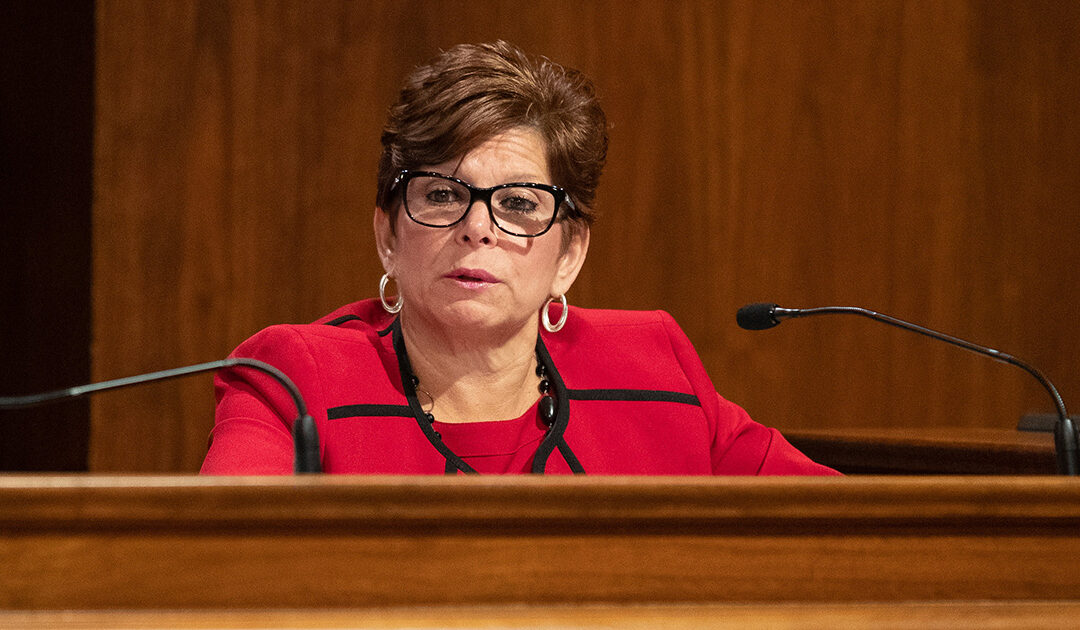
by Christin Brown | January 15, 2021 | News Releases
Philadelphia, PA – January 15, 2021 – State Senator Christine Tartaglione has been reappointed as the Democratic Chairwoman of the Senate Labor & Industry Committee for the 2021-2022 session and as a member of the following Senate standing committees: Law & Justice, Banking & Insurance, and Consumer Protections & Professional Licensure. The Senator has also been appointed to the bicameral Legislative Budget & Finance Committee as well as the Senate Committee on Ethics.
Senator Tartaglione will be joined on the Labor & Industry Committee by Democratic Caucus members Senators John Kane, Tim Kearney, and Lindsey Williams.
“I am honored and excited to begin the important work of the Labor & Industry Committee in the new Senate session and to continue to fight for the issues that are most important to the working people of the Commonwealth,” Senator Tartaglione said. “We have many urgent priorities such as raising the minimum wage, protecting workers from COVID-19 and other workplace threats, as well as improving the unemployment compensation system. I look forward to working with my colleagues from both sides of the aisle to benefit all Pennsylvania families.”
For additional information about the Senate Labor & Industry Committee, visit https://www.legis.state.pa.us/cfdocs/CteeInfo/index.cfm?Code=13&CteeBody=S
For the full list of Senate standing committees, visit https://www.legis.state.pa.us/cfdocs/CteeInfo/StandingCommittees.cfm?CteeBody=S
# # #
If you would like more information about this topic, please contact William Kenny at 215-533-0440 or William.Kenny@pasenate.com.

by Christin Brown | December 24, 2020 | News Releases
Grant recipients include Impact Services, Carl Mackley Houses, Esperanza Health Center, Friends of Father Judge High School, Fox Chase Cancer Center, Frankford Library, and the future Trinity PAL Center, Moss Rehab, and Temple University.
Philadelphia, PA – December 24, 2020 − State Senator Christine Tartaglione (D-Philadelphia) today announced that $10 million in Redevelopment Assistance Capital Program (RACP) grants have been awarded in support of nine community development projects in and around the 2nd Senatorial District.
“I am proud and honored to provide these diverse and community-focused organizations with this critical state funding,” Senator Tartaglione said. “The projects represented here will serve local families and the entire Philadelphia region by improving access to housing, commercial real estate, healthcare services, education, and youth engagement programs. I look forward to continue working with all of these organizations as they improve the lives of the people of the 2nd Senatorial District.”
RACP grants were awarded to the following organizations and projects:
- Impact Services; A & Indiana Campus – Philadelphia; $1,000,000; Impact Services is proposing to develop a 140,000 sf former textile mill to improve the Kensington neighborhood of North Philadelphia by renovating an existing 140,000 sf Mill Building, into a mixed-use project including affordable housing (financed separately) and a multi-tenant community serving building. The renovations will include all new systems, floors, historic windows, roofing, elevators, stairs and finishes. The project will also include completion of site work and parking for access to the building.
- Carl Mackley Houses Limited Partnership; Carl Mackley Affordable Housing Reconstruction (1401 E. Bristol St.); $1,000,000; Project includes restoration of the 4 buildings’ facades and replacement of the bricks where necessary. Including exterior masonry restoration, including deconstruction of exterior walls; manufacturing of replacement jumbo bricks; and reconstruction of the exterior walls with existing and replacement bricks. RACP funds are also requested for replacement of the window enclosures where the masonry restoration will occur.
- Esperanza Health Center; Community Medical Care & Wellness Campus-Kensington-Esperanza – Phase 3 (861 E. Allegheny Ave.); $1,000,000; A new community wellness center will be built at 3222-58 H Street, Philadelphia, PA 19134, developing an open lot that has been vacant for 13 years into a modern facility serving Kensington community residents. It will include a gymnasium, fitness room with exercise equipment, multi-purpose rooms for health education and wellness activities and a conference center.
- Friends of Father Judge High School, Inc.; FOFJHS Career Pathways Academy (3301 Solly Ave.); $500,000; The Career Pathways Academy Building would be a state-of-the-art 20,000sqft two story building built for the purpose of delivery high level vocational education & workforce development. The Oblate Faculty House will be knocked down to make room for the new structure. The structure would have a massive common area for multiple trade disciplines to be taught simultaneously while 3 classrooms and additional breakout spaces would be created on the 1st floor. The second floor will have additional workshop spaces, offices for instructors, and an observation deck for Administrators.
- American Oncologic Hospital d/b/a Fox Chase Cancer Center; Fox Chase Cancer Center ICU Modernization (333 Cottman Ave.); $1,500,000; The project involves the construction of a 15 bed ICU in an addition that will be connected to the current ICU space. This addition will be built on slab and protrude into a beautiful open courtyard in the center of the Fox Chase campus. When construction of the new unit is complete we will break thru the outer ICU wall and connect the spaces. Move all functions into the new space and renovate the current ICU space for waiting, consult room and storage.
- Free Library of Philadelphia Foundation; Renovation of Frankford Library (4634 Frankford Ave.); $1,000,000; The programmatic functions of library-as-community and civic meeting space-as-community are separated by floors but connected by the café which, in turn, acts as a link to the street. From the outside in, the designs include sidewalk upgrades, new landscaping, signage, lighting and a new entry awning and curtainwall glazing, lobby improvements to activate and make more welcoming the space, new meeting and study rooms enclosed with glass partitions at the rear of the main level rear, lower level reconfiguration to provide an additional meeting room, consolidation of existing storage spaces to create a new staff workspace, kitchen renovation, insertion of a new passenger elevator, and main stair reconfiguration.
- Kinder Academy Development Organization; Trinity PAL Center (6901 Rising Sun Ave.); $1,000,000; The project will entail the construction of a new state-of-the-art, historically compatible facility to house the return of the Gibbons PAL program and other community outreach initiatives. Initial construction plans include a basketball court with high ceiling, homework room(s), restrooms, office space for program officers. We also envision additional space that could be used for supplemental community programming. With a commitment from Trinity Church Oxford and the Episcopal Diocese of Pennsylvania, construction could commence on the existing property as part of a long-term lease agreement/endowment covering all operating and maintenance expenses.
- Albert Einstein Healthcare Network; Einstein Medical Center Elkins Park/MossRehab (60 Township Line Road); $1,000,000; The project will include renovation and expansion of the current 4th floor Brain Injury Center to include a robotics gym. The pharmacy at this location will also undergo renovations to meet safety standards and regulatory guideline. Patient rooms will be renovated to reflect safety needs in light of the COVID-19 pandemic.
- Temple University – Of the Commonwealth System of Higher Education; Ritter Hall – Institute on Disabilities and Sponsored Projects relocation (1301 Cecil B. Moore Ave.); $2,000,000; Project will relocate the Institute on Disabilities and Sponsored Projects to a newly renovated central suite within the College of Education’s Ritter Hall Complex. Project will include complete renovation of 14,395 SF space. The architectural design promotes wellness, productivity and efficiency, forming a new academic experience while creating a collaborative working environment and includes new reception areas, conference rooms, offices (both private and open) and support spaces. In addition, all MEP systems and technology will be upgraded to meet the needs of the new space.
RACP is a Commonwealth grant program administered by the Office of the Budget for the acquisition and construction of regional economic, cultural, civic, recreational, and historical improvement projects. These projects have a regional or multi-jurisdictional impact and generate substantial increases or maintain current levels of employment, tax revenues, or other measures of economic activity.
# # #
If you would like more information about this topic, please contact William Kenny at 215-533-0440 or William.Kenny@pasenate.com.

by Christin Brown | December 23, 2020 | News Releases
The Senator urged her General Assembly colleagues to authorize grants to small businesses that have been adversely affected by the pandemic.
Philadelphia, PA – December 23, 2020 – State Senator Christine Tartaglione (D-Philadelphia) applauded today’s announcement by Governor Tom Wolf of his intent to transfer $145 million from the state’s Workers’ Compensation Security Fund into the General Fund so that they may be reallocated for pandemic-related small business relief. Senator Tartaglione also urged her General Assembly colleagues to grant the legislative authorization required to appropriate the funds as grants to small businesses adversely affected by the pandemic.
“I have said throughout the COVID-19 pandemic that we must strive to protect the financial health of workers and their families in addition to their physical health,” Senator Tartaglione said. “The preservation of small businesses such as restaurants and taverns, gyms, and independent entertainment venues, which employed some 2.5 million Pennsylvanians prior to the pandemic, is vital to protecting these jobs.”
In addition to the legislative authorization requirement, the transfer carries a requirement that the Workers’ Compensation Security Fund be reimbursed the full $145 million on a later date. Since the start of the pandemic (March 11th), the Pennsylvania Department of Labor & Industry has received 12,926 new workers’ compensation claims. In 2019, the Department reported 10,071 total claim petitions.
The Pennsylvania Senate Democratic Caucus prioritized a new round of pandemic relief funding for small businesses in their initial PA CARES proposal issued in October, which included $575 million in assistance for bars, taverns, and restaurants; barbers, salons, and the personal care industry; tourism; Main Street and historically disadvantaged businesses; and nonprofit organizations. The Republican-led General Assembly took no action on this proposal and instead used $1.3 billion in remaining federal CARES Act funding to balance the state budget.
Earlier this month, Senate Democrats introduced a new $4 billion PA CARES 21 plan, which includes $800 million in relief for small businesses, with $300 million exclusively for restaurants, taverns, and others in the hospitality industry.
“These businesses are taking on massive debts just to keep their lights on and keep enough staff in place to prepare for the day when they can start rebuilding their businesses again,” Senator Tartaglione said. “They are doing everything they can to improve health protections for patrons and staff. We have an obligation to make them whole.”
For more information about the PA CARES 21 proposal, visit www.pasenate.com/pacares.
# # #
If you would like more information about this topic, please contact William Kenny at 215-533-0440 or William.Kenny@pasenate.com.
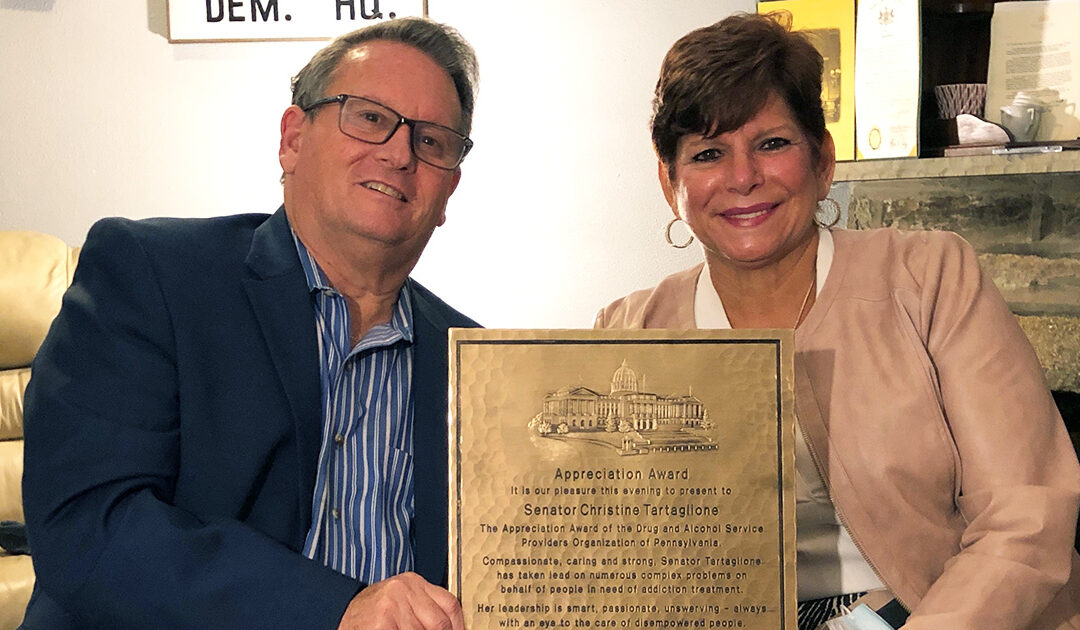
by Christin Brown | October 23, 2020 | News Releases
Philadelphia, PA – October 23, 2020 – The Drug & Alcohol Service Providers Organization of Pennsylvania (DASPOP) have named State Senator Christine Tartaglione as the recipient of its Appreciation Award during the organization’s annual Celebration of Recovery.
Senator Tartaglione also delivered a stirring keynote address during the event, which was held via video conferencing in compliance with COVID-19 mitigation guidelines. The Senator detailed publicly for the first time in her 25-year career her ongoing recovery from alcoholism.
“Discussing such personal matters in a public setting can be awkward or difficult, but it also brings me great comfort,” Senator Tartaglione said. “It’s like lifting a heavy weight off my shoulders. It’s a great relief knowing that I can be forthright about the challenges I face, and I don’t have to pretend like everything is fine even though I know there is a problem.”
The Senator said she has avoided drinking alcohol for the last 17 years. Robert Dellavella, the Chief Executive Officer of Self-Help Movement Inc. in Northeast Philadelphia, presented the award to the Senator during a small gathering of her close friends.
Congressmembers Brendan Boyle and Brian Fitzpatrick, State Senate Minority Leader Jay Costa, and Bucks County Commissioner Gene DiGirolamo were among the dignitaries to congratulate Senator Tartaglione during the online event. DASPOP Founder and President Deb Beck hosted the celebration.
Addressing the many assembled treatment advocates, Senator Tartaglione said, “Individuals and organizations like yours are doing God’s work and are saving human lives. You are healing people physically and spiritually.”
Of her personal story, the Senator added, “I sincerely hope that my message about vulnerability, honesty, and recovery resonates with the many, many people who, like me, struggle with alcohol or drugs. I hope my story will show others that there is a path forward in sobriety and that a fulfilling life awaits them on the other side.”
Senator Tartaglione has advocated strongly in the General Assembly for expanding treatment options, access, and insurance coverage for people who suffer with drug- and alcohol-related illnesses.
Also during the Celebration of Recovery, DASPOP presented Doug Tieman, CEO of Caron Treatment Centers, with its Lifetime Achievement Award. Mr. Tieman has announced his retirement after a long and distinguished career in the drug and alcohol treatment field.
# # #
If you would like more information about this topic, please contact William Kenny at 215-533-0440 or William.Kenny@pasenate.com.
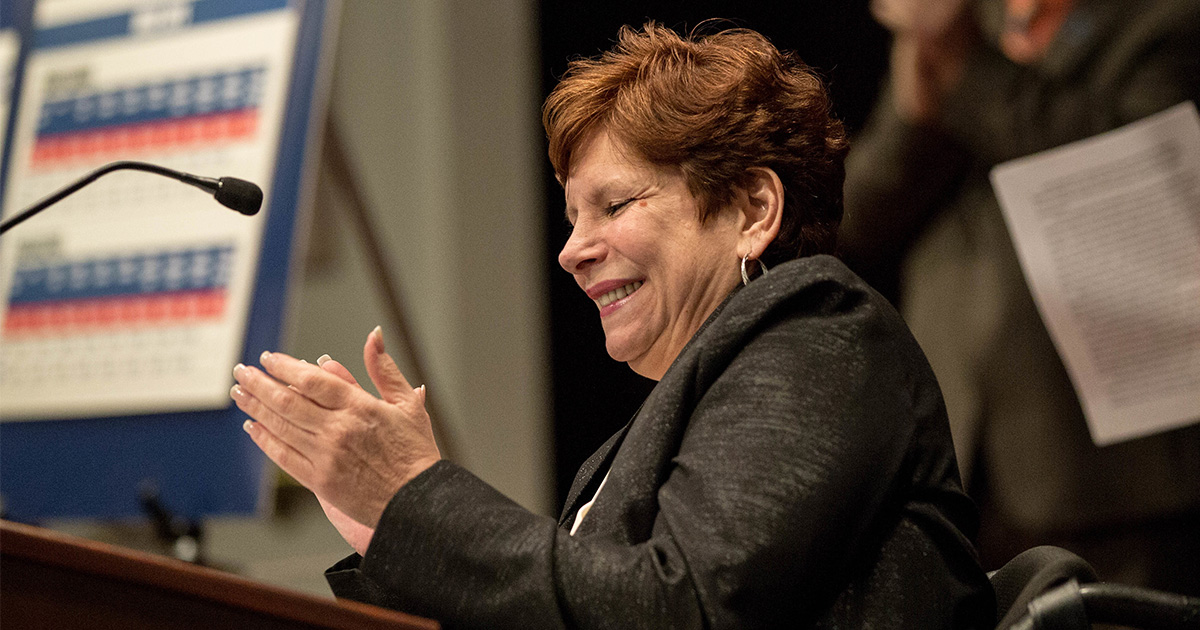
by Christin Brown | October 7, 2020 | News Releases
Governor Wolf’s new OT rules took effect on October 3, requiring employers to pay time-and-a-half to all workers who earn less than $45,500 a year and log more than 40 hours in a week.
Philadelphia, PA – October 7, 2020 – State Senator Christine Tartaglione applauded new overtime rules published in The Pennsylvania Bulletin on October 3 that require all Pennsylvania employers to pay time-and-a-half wages to employees who earn less than $45,500 a year and who log more than 40 hours in a workweek. The new base earnings threshold provides an additional 200,000 Pennsylvania workers with coverage under the state’s overtime pay requirements, regardless of their job titles.
“For far too long, Pennsylvania has allowed many of its worker protections to erode as inflation steadily diminishes the value of the dollar and as the income gap between the wealthy and working-class folks grows larger and larger,” Senator Tartaglione said. “For example, it has been more than 14 years since the General Assembly last raised Pennsylvania’s minimum wage. And prior to these new overtime regulations, it had been 40 years since the Commonwealth raised the income threshold for workers to qualify for mandatory overtime pay.”
Until this year, workers who were earning more than $23,660 in annual base pay could be excluded from mandatory overtime pay protection. That is, if an employer classified the worker as an executive, administrative, or professional salaried employee, the employer did not have to pay overtime wages when the employee logged more than the standard 40 hours in any given workweek.
As of January 1, 2020, the federal government enacted a higher earnings threshold of $35,568 ($684 per week). By default, Pennsylvania’s threshold also increased to that level.
Late last year, Governor Tom Wolf, through the Pennsylvania Department of Labor & Industry, proposed an additional increase in the threshold to $45,500 annually ($875 per week). Following a regulatory review process that included a public comment period, the Commonwealth’s Independent Regulatory Review Commission approved the final rulemaking earlier this year. The new regulations took effect on October 3.
“We know from extensive academic research and from the examples we see in many other states that investments in our workforce through policies like mandatory overtime pay and higher minimum wages benefit our communities and our economy,” Senator Tartaglione said. “Our workers are consumers too. When we put more money in their pockets and improve their quality of life, everyone stands to benefit.”
According to the Keystone Research Center, more than four decades ago, more than 60% of salaried workers in the United States received time-and-a-half pay automatically when they worked more than 40 hours in a week, because exemption from overtime pay protection was only intended to apply to high-level managers and professionals who were already being well-compensated without overtime pay.
Since 1980, the cumulative rate of inflation in the U.S. is 215.4%. Therefore, $23,660 in 1980 dollars equates to $74,632 in 2020 dollars.
# # #
If you would like more information about this topic, please contact William Kenny at 215-533-0440 or William.Kenny@pasenate.com.

by Christin Brown | October 7, 2020 | News Releases
To date 258 local business have received or will soon receive $4.5 million in grants through the Statewide Small Business Assistance program.
Philadelphia, PA – October 7, 2020 – State Senator Christine Tartaglione today announced that 258 small businesses in and around the 2nd Senate District have received or will soon receive a combined $4.5 million in COVID-19 relief funding through Statewide Small Business Assistance (SBA), a $225 million program created by the General Assembly in May through its comprehensive PA CARES legislation.
These local businesses spanning portions of North and Northeast Philadelphia are among about 900 citywide and more than 4,100 across the state that have received grants ranging from $5,000 to $50,000 or have completed a verification process that will enable them to obtain their approved funding imminently.
“Pennsylvania businesses and their employees have worked very hard and made many sacrifices that have enabled the Commonwealth to reduce the spread of COVID-19,” Senator Tartaglione said. “As they continue their difficult reopening process, it is crucial that we provide them with resources to catch up financially and to operate safely moving forward.”
In all, more than 10,000 Pennsylvania businesses have received preliminary approval for a combined $192 million in grants through two rounds of SBA funding. Businesses in all 67 Pennsylvania counties have been approved. In Philadelphia, about 1,200 businesses have received preliminary approval. Additional verifications will be announced as they occur.
As adopted by the General Assembly and implemented by the administration of Governor Tom Wolf, the SBA program prioritized applicant businesses owned by low- or moderate-income individuals; those owned by women or minorities; those in communities with relatively high poverty rates, low median incomes, high unemployment rates, and high population loss; those in designated revitalization areas; those in rural areas; and those operating in business sectors most-impacted by the pandemic.
The program is being administered through 17 nonprofit Community Development Financial Institutions (CDFIs) that have been certified by the Commonwealth and whose primary activity is providing financing options for small businesses.
As of October 4, $76.8 million in SBA grants had been distributed or received final approval for distribution statewide, while $16 million had been distributed or received final approval for distribution in Philadelphia.
For more information about the program and a listing of the verified grant recipients, visit https://pabusinessgrants.com/
# # #
If you would like more information about this topic, please contact William Kenny at 215-533-0440 or William.Kenny@pasenate.com.

by Christin Brown | September 15, 2020 | News Releases
Additional SBA grants will be distributed in the coming weeks as part of a $225 million COVID-19 relief program created by the Pennsylvania General Assembly in May.
Philadelphia, PA – September 15, 2020 – State Senator Christine Tartaglione today announced that 183 small businesses in and around the 2nd Senate District have received or will soon receive a combined $3,050,000 in COVID-19 relief funding from the Commonwealth as part of Pennsylvania Statewide Small Business Assistance, a $225 million program created in the comprehensive PA CARES legislation adopted by the General Assembly in May.
These local businesses are among 647 in Philadelphia and more than 3,000 statewide that have completed all required financial verifications and accepted the terms of the grant program in writing. In all, approximately 5,000 Pennsylvania businesses, including more than 1,100 in Philadelphia, have received preliminary approval for individual grants of up to $50,000. Additional verifications will be announced as they occur in the coming weeks.
“We are at a critical juncture for Pennsylvania’s small businesses and have been so since the very beginning of the COVID-19 emergency in March,” Senator Tartaglione said. “My General Assembly colleagues and I have been working very hard to provide resources to all those who have been negatively impacted by the pandemic, including small businesses and their employees. These funds will help them cover operating expenses, reopening costs, technical assistance, risk reduction training, and debt relief.”
The list of successful grant applicants includes many business types impacted most by the coronavirus, such as restaurants and taverns, hair salons and barber shops, childcare centers, and special events facilities, as well as more-specialized business types such as bridal shops, bakeries, chiropractors, gift stores, and commercial art studios.
The grant program is being administered through 17 nonprofit Community Development Financial Institutions (CDFIs) that have been certified by the Commonwealth and whose primary activity is providing financing options for small businesses. As of September 4, more than $55 million had been distributed or received final approval for distribution.
Two rounds of applications were conducted to provide interested businesses with multiple opportunities to apply for these limited funds. The final application window concluded on August 28. To be eligible, businesses must have been in operation prior to February 15, 2020, and had 25 or fewer full-time equivalent employees prior to that date; had annual revenue of no more than $1 million prior to the pandemic; and been generating at least 51% of their revenues in Pennsylvania. Priority was given to applicants with women ownership, those located in designated “Main Street” or “Elm Street” districts, those in rural communities, and those that are at least 51% owned and operated by persons who are Black, Hispanic, Native American, Asian American, or Pacific Islander. For more details about the program, visit www.pabusinessgrants.com.
# # #
If you would like more information about this topic, please contact William Kenny at 215-533-0440 or William.Kenny@pasenate.com.

by Christin Brown | September 9, 2020 | News Releases
Community colleges, state-related universities, and a technical school would be awarded a combined $130 million in CARES Act funding to cover COVID-related costs.
Philadelphia, PA – September 9, 2020 − The Pennsylvania Senate Appropriations Committee today advanced legislation sponsored by State Senator Christine Tartaglione and Senate Democratic Leader Jay Costa that would allocate $130 million in federal CARES Act funding to help higher education institutions in the Commonwealth manage financial hardships caused by the COVID-19 pandemic.
Senate Bill 1226 proposes to grant $35 million to Pennsylvania’s community colleges, $25 million each to Temple University, the University of Pittsburgh, and Penn State University, $10 million to Lincoln University, and $10 million to Thaddeus Stevens College of Technology. Previously, the Senate adopted legislation to allocate more than $72 million in federal CARES Act funding to PA State System of Higher Education universities and to the Pennsylvania Higher Education Assistance Agency.
The Appropriations Committee adopted SB1226 unanimously. The legislation will advance to the full Senate for consideration.
“Pennsylvania’s state-related institutions, community colleges, and technical schools have suffered great financial setbacks due to the pandemic,” Senator Tartaglione said. “Despite these challenges, our higher education community has responded to this crisis in numerous ways to assist students and the entire Commonwealth as we navigate this uncharted territory.”
“Shuttering campuses; transitioning to distance learning; refunding room, board, and activities fees; and the potential loss of enrollment have all caused financial hardship and uncertainty for these institutions. They have already received some federal funding, but more must be done to help sustain them through this difficult time.”
In keeping with federal requirements, all CARES Act funds will be used to cover costs incurred by the recipients due to the COVID-19 pandemic.
# # #
If you would like more information about this topic, please contact William Kenny at 215-533-0440 or William.Kenny@pasenate.com.
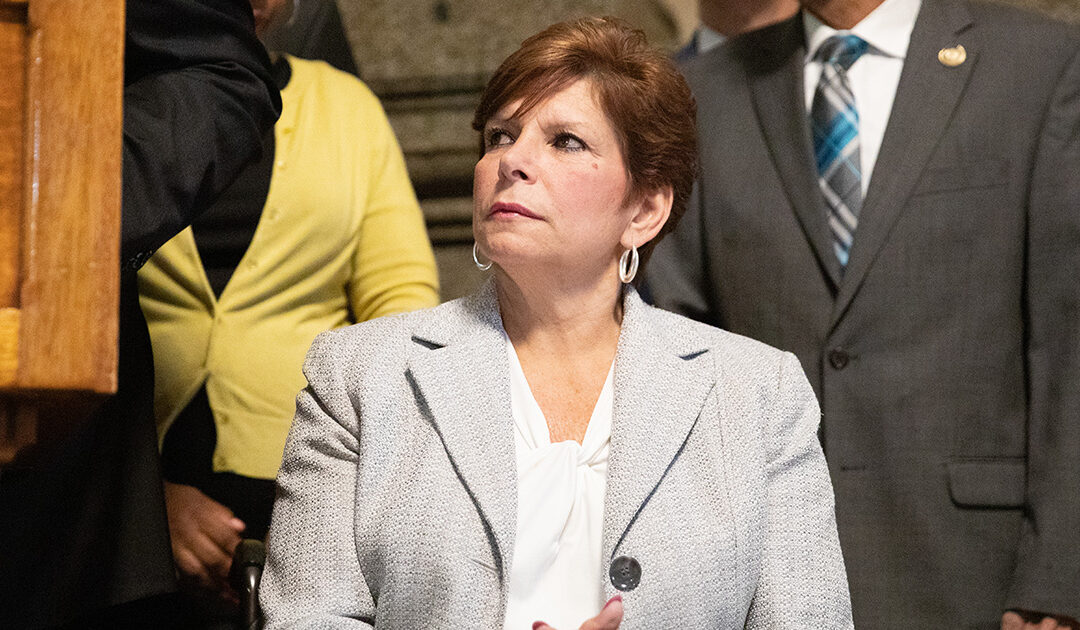
by Christin Brown | August 3, 2020 | News Releases
The legislators jointly authored a letter to U.S. House leadership calling for 100% federal reimbursement of unemployment insurance costs that nonprofits incur.
Philadelphia, PA – August 3, 2020 − Pennsylvania State Senator Christine M. Tartaglione (D-Philadelphia), Democratic Chair of the PA Senate Labor & Industry Committee, and Congressman Brendan F. Boyle (PA-02), member of the U.S. House Ways and Means Committee, sent a letter to U.S. House Leadership urging the inclusion of language that supports the nonprofit sector in the next coronavirus relief package.
The letter authored by Congressman Boyle and Senator Tartaglione requests that the next COVID-19 response package includes language providing 100% reimbursement by the federal government of the costs of unemployment benefits they incur.
“From a social services and employment standpoint, the viability of nonprofits is essential to the Commonwealth of Pennsylvania and to the nation,” Senator Tartaglione said. “These charitable organizations enable millions of Americans to bridge the gap between poverty and dignity, and they bolster the broader economy with critically needed jobs at a time of historic unemployment.”
“From food banks to health clinics, nonprofits in Philadelphia and across the nation have strengthened our communities by providing critical services throughout this pandemic,” said Congressman Boyle. “We must look to support our local partners and make it easier, not harder, for them to survive this challenging time. By providing 100% reimbursement, we will be investing in our local communities and ensuring much needed services do not terminate as we begin to see sharp spikes in the number of new cases.”
In Pennsylvania alone, the nonprofit sector employs 16% of the total workforce, which equates to more than 807,000 individuals. While most nonprofits are hoping to maintain their employees and services, many of these nonprofits are reaching their breaking point as the crisis continues to drain their limited resources. The proposal to grant nonprofits 100% reimbursement for the costs of unemployment benefits has received bipartisan support. A copy of the letter can be viewed here.
# # #
If you would like more information about this topic, please contact William Kenny at 215-533-0440 or William.Kenny@pasenate.com.
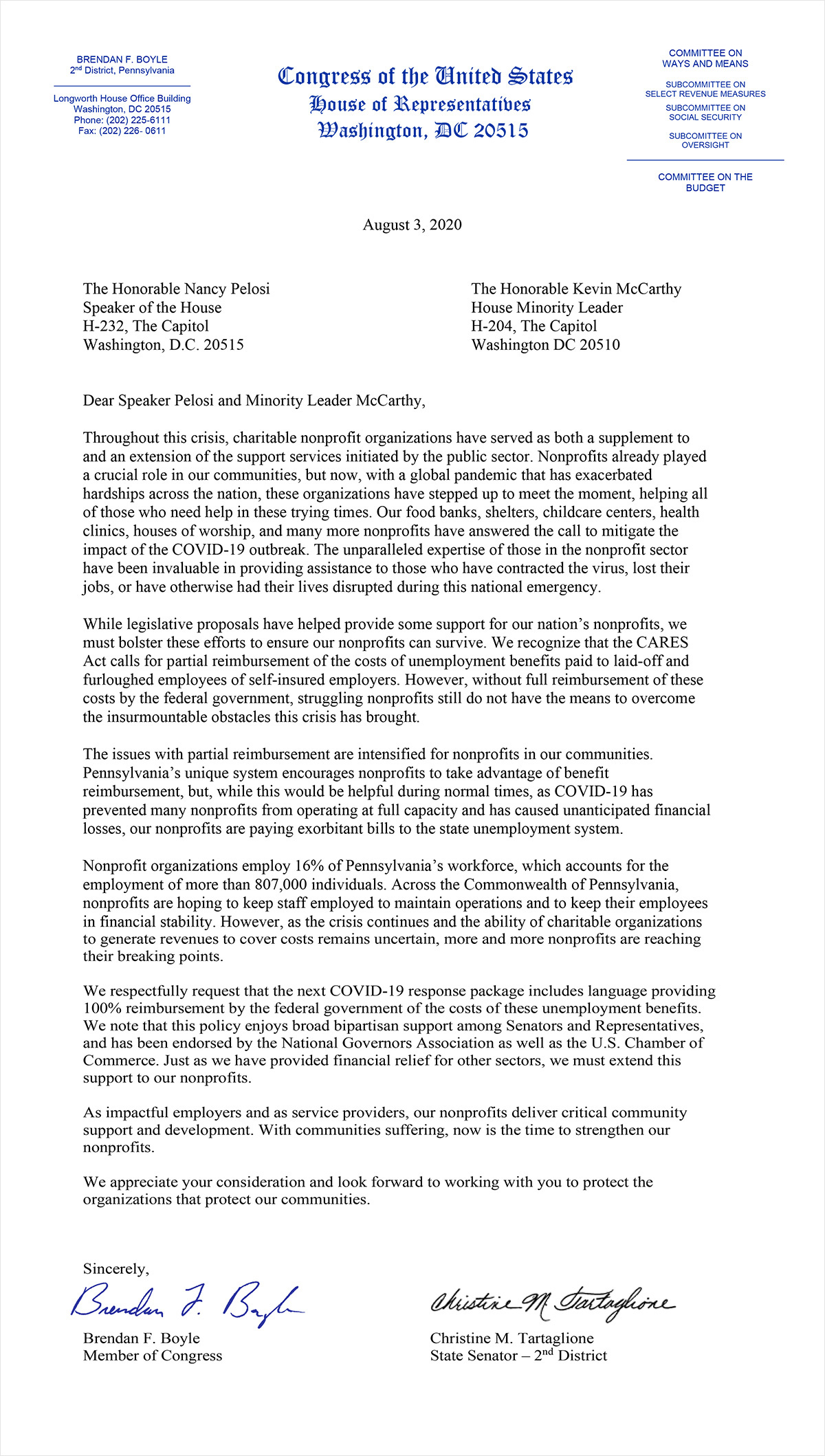

by Christin Brown | July 8, 2020 | News Releases
Unity Recovery was among 14 agencies statewide to receive a combined $2 million in Substance Abuse and Mental Health Services Administration grants.
Philadelphia, PA – July 8, 2020 – State Senator Christine Tartaglione announces that Unity Recovery of Philadelphia has been awarded almost $200,000 by the Pennsylvania Department of Drug and Alcohol Programs (DDAP) in the form of a Substance Abuse and Mental Health Services Administration (SAMHSA) grant.
The funding will allow Unity to create the Philadelphia Recovery Friendly Workplace initiative, a program that will advocate for the hiring and continued employment of people in opioid use disorder recovery while helping to foster a more-inclusive culture in Southeastern Pennsylvania workplaces. SAMHSA grants totaling $2 million were awarded to 14 organizations throughout Pennsylvania. The grant funds originated with $75 million in federal funding allocated to the Commonwealth last September to support statewide efforts to address the opioid crisis.
“I am very encouraged that the Wolf administration is providing agencies like Unity Recovery with the resources they need to make a real, local, and personal impact in the communities they serve,” Senator Tartaglione said. “The administration has been steadfast in its commitment to lessening the opioid crisis in Pennsylvania. These grants will continue and expand that vital work.”
“We have not lost focus on the continuing opioid crisis in Pennsylvania,” Governor Wolf said. “And now more than ever, employment services are vital to help people struggling during the pandemic with the loss of a job or need to find employment. These grants will help those with substance use disorder have a better chance at recovery by helping to access employment.”
Statewide, awardees will provide a wide variety of employment services including vocational assessments, resume writing, interviewing skills, job placement, and transportation assistance. Each agency has identified one local employer that has committed to hiring individuals in recovery from opioid use disorder.
Unity’s grant, valued at $198,772, will help it implement its Recovery Friendly Workplace model in Philadelphia. Unity has previously implemented this model successfully in New Hampshire, Nevada, and Wisconsin.
“I am committed to informing and referring constituents of the 2nd Senate District to the type of peer-based recovery and employment support services provided by Unity,” Senator Tartaglione said. “Not only do these types of support services help people maintain their recovery, they elevate their likelihood of gaining and maintaining employment and help them to develop positive connections within the larger community.”
# # #
If you would like more information about this topic, please contact William Kenny at 215-533-0440 or William.Kenny@pasenate.com.

by Christin Brown | June 5, 2020 | News Releases
Letter signed by 17 Senators Calls for Immediate Hearings
Harrisburg, June 5, 2020 − Senator John Sabatina (D-Philadelphia) implored Governor Wolf to suspend the termination of 700 Pennsylvania employees until public hearings can be held on the clandestine decision by the Pennsylvania Turnpike Commission (PTC).
“It is absurd that we would send 700 more Pennsylvanians to the unemployment line during this crisis,” Sabatina said, who serves as the Democratic Chair of the Senate Transportation Committee. “We agreed these loyal state employees would be retained until the end of 2021, when the Turnpike would go cashless.”
Sabatina wasn’t alone in his dismay. Senator Tartaglione, Democratic Chair of the Labor Committee, also questioned the decision.
“This sudden decision to terminate 700 hardworking Turnpike employees violates the agreement we had in place and comes at a time when the Commonwealth should be doing everything it can to curtail the loss of jobs,” said Senator Tartaglione, the Democratic Chair of the Senate Labor and Industry Committee. “We must insist that all stakeholders have their say in a public forum as part of any decision-making process of this magnitude.”
In all, 17 Senators are calling for the hearings before the June 18th termination date. The letter was sent to Governor Wolf on Friday.
You can read Senator Sabatina’s letter here:
The Honorable Governor Tom Wolf
Office of the Governor
508 Main Capitol Building
Harrisburg, PA 17120
June 5, 2020
Re: Suspend Elimination of Toll Collector Positions
Dear Governor Wolf:
We are deeply disturbed at the stealthy manner in which the Pennsylvania Turnpike Commission voted to eliminate over 700 toll collector jobs this week.
Prior to Tuesday June 2nd, all parties understood that under the original agreement, the PTC promised to employ these Pennsylvanians until the exits went completely cashless at the end of 2021. During this timeframe, the remaining toll collectors would be able to apply for existing positions within the Commission, help get placed in appropriate Commonwealth vacancies, or receive a tuition credit to help receive new job training. To our knowledge, none of the above terms of the agreement have been met.
Also prior to June 2nd, we believed that we had an open and transparent relationship with the PTC. On May 12, 2020, during a Senate Transportation Committee Hearing regarding Turnpike finances, the opportunity presented itself for the PTC to discuss potential layoffs. Despite questions raised by Senate members on the future of the toll workers, no meaningful discussion on this topic was advanced by any member of the PTC.
We, therefore, believe that it is necessary to conduct an informational hearing to determine the fundamental reasons behind the PTC’s failure to abide by the original agreement regarding termination as well as its failure to notify, inform and discuss this matter with the Legislature. We understand the financial difficulties placed upon the Turnpike, however, it is blatantly unconscionable to mislead employees into thinking that their jobs were somewhat secure for the next year and a half, while knowing that these loyal employees really had less than a month to find another job in the midst of a pandemic.
These people have families that depend on them to provide necessities during this extremely difficult time and adding 700 Pennsylvanians to the unemployment rolls will not benefit the Commonwealth.
We respectfully request that this decision to layoff 700 toll collectors on June 18, 2021 be suspended until it can be established with certainty through an informational hearing that there is not some reasonable alternative that allows the PTC to keep its original promise to its faithful employees.
Thank you for your immediate attention to this matter and we await your prompt response.
Sincerely,
Senator John P. Sabatina, Jr. Chairman, Transportation Committee
Senator Jay Costa 43rd Senatorial District
Senator Anthony Williams 8th Senatorial District
Senator Tina Tartaglione 2nd Senatorial District
Senator John Blake 22nd Senatorial District
Senator Vincent Hughes 7th Senatorial District
Senator Judy Schwank 11th Senatorial District
Senator Lisa Boscola 18th Senatorial District
Senator James Brewster 45th Senatorial District
Senator Wayne Fontana 42nd Senatorial District
Senator Timothy Kearney 26th Senatorial District
Senator Andrew Dinniman 19th Senatorial District
Senator Lindsey Williams 38th Senatorial District
Senator Maria Collett 12th Senatorial District
Senator Pam Iovino 37th Senatorial District
Senator Katie Muth 44th Senatorial District
Senator Larry Farnese 1st Senatorial District
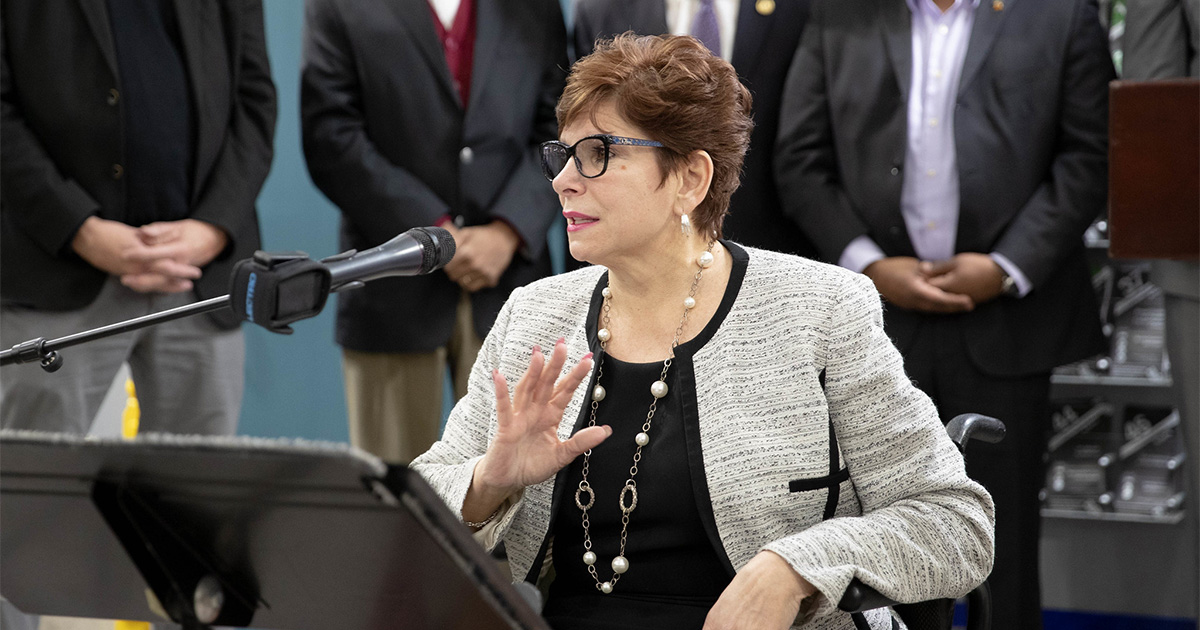
by Christin Brown | June 1, 2020 | News Releases, oped
On Monday, the Philadelphia Inquirer published the following opinion article by Senator Tartaglione in which she called for the immediate adoption of her Senate Bill 464 to strengthen workplace health and safety protections for state, county, and municipal employees, providing them with the same protections that all federal and private-sector employees already receive.
Pa. Capitol COVID disclosure issue underscores much-needed workplace protections for all | Opinion
By Christine Tartaglione
Amid a pandemic, the sharing of timely information is key to stopping the spread of illness.
That is why I was shocked to learn only through news media reports more than a week after the fact that a member of the Pennsylvania House of Representatives had tested positive for COVID-19. And I was appalled that the partisan leadership of the House chose not to notify, in a timely fashion, the member’s colleagues from opposing parties, his counterparts in the Senate, or the state employees whose jobs require them to be in the halls and offices of the Capitol during a pandemic.
Prompt and comprehensive notification could have and should have been conducted, but it was not. In light of these events, I renew my call for the General Assembly to immediately advance my legislation, Senate Bill 464, which would, for the first time, provide all public employees on the state and local levels with the same workplace health and safety protections enjoyed by all the nation’s federal and private-sector employees.
In his public statement Wednesday, the House member reported that he last visited the Capitol on May 14, was tested on May 18 after developing typical COVID-19 symptoms, and was confirmed positive on May 20.
The Centers for Disease Control and Prevention tells us that the incubation period for COVID-19 is 14 days. Therefore, by the time this member and his caucus notified the rest of us of a potential exposure, the virus could have been spread through the chain of social contacts to literally hundreds of individuals.
In subsequent public statements, the member’s caucus has reportedly cited health-care privacy laws for the decision to withhold this critical and potentially lifesaving information from people who were and are directly affected by it. However, the restrictions codified in the Health Insurance Portability and Accountability Act (HIPAA) apply only to health insurers, health-care clearinghouses, and health-care providers. They do not apply to employers.
The member personally stated that he kept quiet about his diagnosis “out of respect for my family, and those who I may have exposed.” Yet, I am quite certain that the people who he may have exposed would have very much appreciated a heads up about it.
More than that, being informed promptly about workplace health hazards should be their right.
Among many other provisions, SB 464 would require state and local public employers, including school districts, to “provide reasonable and adequate protection to the lives, safety or health of the employees.” Employers would have to notify employees of the confirmed presence of health hazards like COVID-19 in the workplace.
Further, the legislation would create the Pennsylvania Occupational Safety and Health Review Board to oversee and enforce its workplace health and safety requirements, including worker notification of the hazards that threaten them. Private and federal employers already furnish their employees with these protections.
As the spread of COVID-19 in Pennsylvania slows and businesses begin to reopen throughout the commonwealth, employers must keep workers informed about the risks that they face. If employers choose not to do that, then the law should mandate that they do so. Senate Bill 464 should receive consideration immediately — as should all employees.

by Christin Brown | April 23, 2020 | News Releases
The Continuing of Education Equity Grants may be used to purchase computer equipment, such as laptops, tablets and internet hotspots, as well as paper lessons and coursework.
Philadelphia, PA – State Senator Christine Tartaglione (D-Philadelphia) announces that the Pennsylvania Department of Education has awarded $128,450 in grants to schools within the 2nd Senate District as well as $500,000 directly to the School District of Philadelphia for the purchase of computers and other instructional materials.
Continuing of Education Equity Grants (CEEG) are designed to help provide access and inclusion for all learners by bridging the gap for students who are limited in their ability to participate in continuity of education. The new awards are applicable for the current 2019-2020 academic year.
“I applaud the Department of Education and the Wolf Administration for recognizing the urgent need among our schools for these resources in light of the COVID-19 disaster emergency,” Senator Tartaglione said. “Brick-and-mortar schools are closed to mitigate the public health threat of the coronavirus, but student learning must continue. We owe it to our children to provide them with the resources they need to learn and prepare for their future.”
The School District of Philadelphia was awarded $500,000. Additional grant recipients in the 2nd Senate District included Mastery Charter-Smedley Campus ($36,500), John B. Stetson Charter ($43,950), Antonia Pantoja Community Charter ($40,000), and Northwood Academy Charter ($8,000).
CEEG funding may be used to purchase computer equipment, such as laptops, tablets, and internet hot spots, as well as other instructional materials including paper lessons and coursework. Schools with the highest percentages of students lacking access to resources were given priority in receiving these grants.
For additional information about the grant program and COVID-19 resources for schools, visit the Department of Education website at education.pa.gov.
# # #
If you would like more information about this topic, please contact William Kenny at 215-533-0440 or William.Kenny@pasenate.com.

by Christin Brown | April 15, 2020 | News Releases
Philadelphia, PA, April 15, 2020 – State Senator Christine Tartaglione (D-Philadelphia) today applauded Pennsylvania Department of Health Secretary Rachael Levine and Governor Tom Wolf for issuing an executive order implementing the senator’s legislation that bolsters COVID-19 protections for employees of businesses that are authorized to continue in-person operations during the statewide disaster emergency.
Among many new mandates, the order establishes requirements for social distancing, for the provision and use of facemasks in the workplace, for the reduction of large gatherings, for limited visitor access to workplaces, and for sufficient staffing levels. In addition, all components of the order must be communicated to employees in their primary language, thereby ensuring that all workers can understand the new requirements.
All of these elements and many others had been proposed by Senator Tartaglione in two Senate bills: the COVID-19 Food Worker Safety Act (SB 1101) and the COVID-19 Grocery Store Safety Act (SB 1102). Earlier today, the Senate’s Rules & Executive Nominations Committee refused to adopt the language from Senator Tartaglione’s bills as part of an omnibus amendment to a Republican-sponsored bill focused on the reopening of non-essential businesses in the Commonwealth amid the pandemic.
In a party-line vote, the Senate adopted the Republican bill without Senator Tartaglione’s comprehensive worker protections. At Tartaglione’s urging, Secretary Levine and Governor Wolf implemented those protections through the executive order.
“It is vital that we require businesses to practice these common-sense and scientifically proven safety protocols for the protection of workers and the public at-large. And that is what this order does,” said Senator Tartaglione, who is Democratic chairwoman of the Senate Labor & Industry Committee. “Many of the measures included in this order were part of legislation that I proposed. I applaud this swift action by Secretary Levine and Governor Wolf to implement these much-needed protocols.”
Specifically, the order establishes protocols to help employees maintain social distance during work. Employers that are authorized to continue in-person operations are required to:
- Provide masks for employees to wear during their time at the business, and make it a mandatory requirement while at the work site, except to the extent an employee is using break time to eat or drink, in accordance with the guidance from the Department of Health and the CDC. Employers may approve masks obtained or made by employees in accordance with this guidance;
- Stagger work start and stop times for employees when practical to prevent gatherings of large groups entering or leaving the premises at the same time;
- Provide sufficient space for employees to have breaks and meals while maintaining a social distance of 6 feet, including limiting the number of employees in common areas and setting up seating to have employees facing forward and not across from each other;
- Conduct meetings and training virtually. If a meeting must be held in person, limit the meeting to the fewest number of employees possible, not to exceed 10 employees at one time and maintain a social distance of 6 feet.
- Ensure that the facility has a sufficient number of employees to perform all measures listed effectively and in a manner that ensures the safety of the public and employees;
- Ensure that the facility has a sufficient number of personnel to control access, maintain order, and enforce social distancing of at least 6 feet;
- Prohibit non-essential visitors from entering the premises of the business; and
- Ensure that all employees who do not speak English as their first language are aware of procedures by communicating the procedures, either orally or in writing, in their native or preferred language.
Upon discovery of an exposure to a person who is a probable or confirmed case of COVID-19, businesses are also ordered to implement temperature screenings before employees enter the business prior to the start of work and send any employee home who has an elevated temperature of 100.4 degrees Fahrenheit or higher. Sick employees should follow CDC-recommended steps. Employees should not return to work until the CDC criteria to discontinue home isolation are met, in consultation with the health care providers and state and local health departments. Employers are encouraged to implement liberal paid time off for employees who are on home isolation.
Upon an exposure, businesses are also ordered to do the following:
- Close off and ventilate areas visited by that individual;
- Wait a minimum of 24 hours, or as long as practical, before beginning cleaning and disinfection;
- Clean and disinfect all spaces, especially commonly used rooms and shared electronic equipment;
- Identify and notify employees who were in close contact with that individual (within about 6 feet for about 10 minutes); and
- Ensure that the business has a sufficient number of employees to perform these protocols effectively and immediately.
In addition to the social distancing, mitigation and cleaning protocols, businesses that serve the public within a building or defined area are ordered to implement the following, based on the size of the building and number of employees:
- Require all customers to wear masks while on premises, and deny entry to individuals not wearing masks, unless the business is providing medication, medical supplies, or food, in which case the business must provide alternative methods of pick-up or delivery of goods, except individuals who cannot wear a mask due to a medical condition (including children the age of 2 years) may enter the premises without having to provide medical documentation;
- Conduct business with the public by appointment only and, to the extent that this is not feasible, limit occupancy to no greater than 50 percent of the number stated on their certificate of occupancy as necessary to reduce crowding in the business and at check-out and counter lines in order to maintain a social distance of 6 feet, and place signage throughout each site to mandate social distancing for both customers and employees;
- Alter hours of business so that the business has sufficient time to clean or to restock or both;
- Install shields or other barriers at registers and check-out areas to physically separate cashiers and customers or take other measures to ensure social distancing of customers from check-out personnel, or close lines to maintain a social distance between of 6 feet between lines;
- Encourage use of online ordering by providing delivery or outside pick-up;
- Designate a specific time for high-risk and elderly persons to use the business at least once every week if there is a continuing in-person customer-facing component;
- In businesses with multiple check-out lines, only use every other register, or fewer. After every hour, rotate customers and employees to the previously closed registers. Clean the previously open registers and the surrounding area, including credit card machines, following each rotation;
- Schedule handwashing breaks for employees at least every hour; and
- Where carts and handbaskets are available, assign an employee to wipe down carts and handbaskets before they become available to a new customer.
Failure to comply with these requirements will result in enforcement action that could include citations, fines, or license suspensions. Compliance with the order will be enforced beginning Sunday, April 19 at 8:00 PM.
The governor has directed the following state agencies and local officials to enforce orders related to the COVID-19 pandemic to the full extent of the law:
- Pennsylvania Liquor Control Board
- Department of Health
- Department of Agriculture
- Department of Labor and Industry
- Pennsylvania State Police
- Local officials, using their resources to enforce closure orders within their jurisdictions
This order follows another order by Dr. Levine providing direction for maintaining and cleaning buildings for businesses authorized to maintain in-person operations under her and Governor Tom Wolf’s life-sustaining business orders announced March 19.
Governor Tom Wolf also recommends that Pennsylvanians wear a mask any time they leave their homes for life-sustaining reasons.
# # #
If you would like more information about this topic, please contact William Kenny at 215-533-0440 or William.Kenny@pasenate.com.

by Christin Brown | March 26, 2020 | News Releases
Philadelphia, PA, March 26, 2020 – State Senator Christine Tartaglione (D-Philadelphia) advises Pennsylvanians who are seeking to maintain or enter outpatient drug and alcohol recovery programs during the COVID-19 emergency that help is available to them through online and telephone-based counseling services and meetings.
“At this difficult time for all Pennsylvanians, it is imperative that we as a community redouble our efforts to support those among us who struggle with substance use disorder and those in recovery,” Senator Tartaglione said. “I am pleased to report that the Commonwealth’s Department of Drug and Alcohol Programs, as well as many private-sector programs are acting to mitigate the new challenges created by the coronavirus pandemic.”
While Pennsylvania remains under the disaster emergency declared by Governor Tom Wolf on March 6, all designated Single County Authorities that have received grant funding from the Department of Drug and Alcohol Programs for outpatient substance use disorder services may use those funds to provide counseling and other clinical services using telehealth technology.
Qualified counselors may provide telehealth using real-time, two-way interactive audio-video transmission services in licensed Drug and Alcohol Outpatient clinics. While the two-way interactive transmission is the preferred method, services provided by telephone and in the home are also acceptable.
For further information from the Department of Drug and Alcohol Programs, visit: https://www.ddap.pa.gov/pages/default.aspx
In addition, numerous Alcoholics Anonymous and Narcotics Anonymous groups are conducting meetings online and via teleconferencing. The following links provide information for online Alcohol Anonymous groups:
In addition, the following links provide information for online Narcotics Anonymous groups:
# # #
If you would like more information about this topic, please contact William Kenny at 215-533-0440 or William.Kenny@pasenate.com.
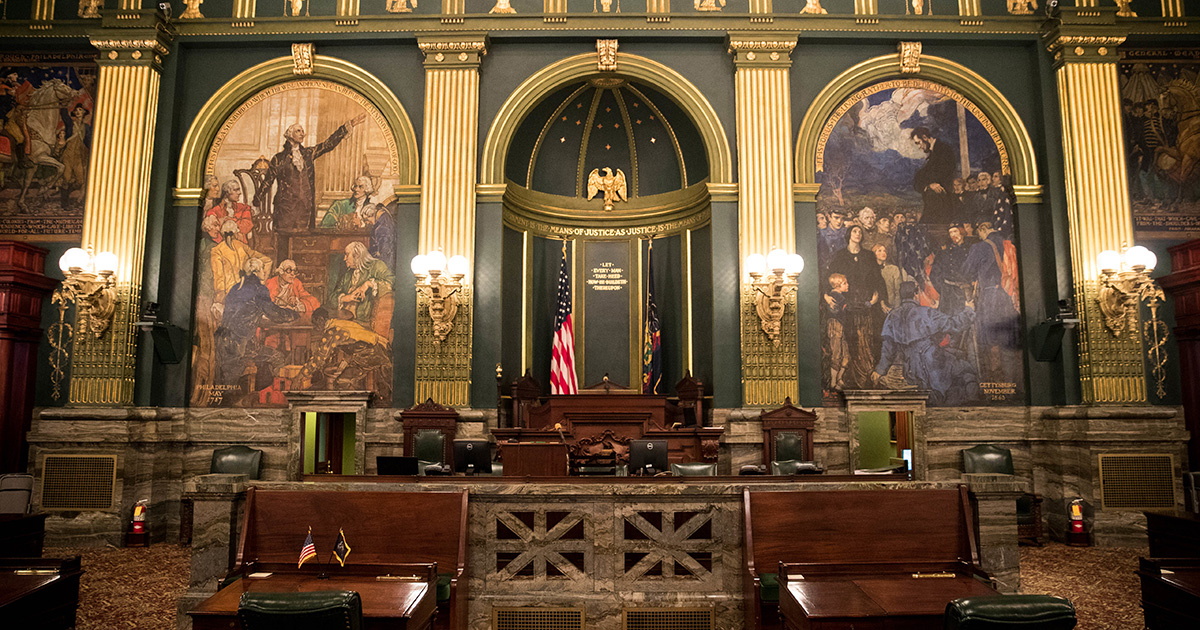
by Christin Brown | March 25, 2020 | News Releases
Philadelphia, PA, March 25, 2020 – State Senator Christine Tartaglione (D-Philadelphia) joined her Senate colleagues and members of the Pennsylvania House today as they unanimously adopted comprehensive COVID-19/coronavirus relief legislation for workers and employers throughout the Commonwealth.
Both chambers adopted an amended version of House Bill 68, which includes a provision that enables displaced workers to obtain unemployment compensation sooner, and a provision that relieves employers of unemployment benefits charges in instances where the coronavirus emergency caused the employee layoff.
“Just as the thousands of individuals afflicted by this illness need time and resources to recover, displaced workers and their employers need time and resources to get back on their feet again,” Senator Tartaglione said during the Senate’s remote legislative session. “This legislation provides them with the time and resources they need by helping to mitigate the financial setbacks caused by the coronavirus.”
As amended, HB 68 codifies the Wolf administration’s waiver of the one-week waiting period usually required for displaced workers before they may apply for unemployment benefits. The waiting period waiver will remain in effect for the duration of the coronavirus emergency declaration. The bill also codifies the administration’s suspension of the work search and registration requirements of the Commonwealth’s unemployment compensation law during the emergency.
To ensure that displaced workers receive comprehensive and timely information about the availability of unemployment benefits, the amended HB 68 requires employers to notify employees upon separation from the company of the availability of unemployment compensation, the employee’s ability to file a benefits claim, website information for filing a claim, and the information that the employee must provide to submit a claim.
The amended bill further requires the Department of Labor & Industry to provide companies relief from unemployment benefit charges in cases where the employee separation resulted directly from coronavirus or from restrictions implemented by the government in response to the pandemic. In addition, the bill extends the window for employers to request full relief from benefit charges from 15 days to 21 days.
The Department of Labor Industry projects that the bill will result in an increase of $6 million in relief from benefit charges granted to employers, as well as a reduction of $1 million annually in unemployment compensation contributions by employers.
# # #
If you would like more information about this topic, please contact William Kenny at 215-533-0440 or William.Kenny@pasenate.com.

by Christin Brown | March 18, 2020 | News Releases
The Commonwealth Financing Agency has transferred additional funding into the Small Business First program to support low interest working capital loans.
Philadelphia, PA, March 18, 2020 – State Senator Christine Tartaglione (D-Philadelphia) is advising Pennsylvania small businesses that they may be eligible for low interest loans of up to $100,000 to fulfill their working capital needs during the COVID-19/coronavirus emergency.
The Commonwealth Financing Agency (CFA) has transferred $40 million into the Small Business First (SBF) program administered by the Pennsylvania Industrial Development Authority (PIDA). This funding will be combined with $21 million from PIDA’s own resources for a total of $61 million in additional SBF funding.
“Small businesses are bearing a tremendous burden during the coronavirus emergency as they have been asked to reduce or suspend their non-essential operations and as Pennsylvania consumers have been advised to practice social distancing,” Senator Tartaglione said. “These loans will help small businesses pay their bills and keep the lights on until this public health crisis subsides.”
CFA moved $40 million from PIDA’s Machinery and Equipment Loan Fund to SBF with the support of the four caucuses of the Pennsylvania General Assembly and Governor Tom Wolf. These funds will be used to award working capital loans of up to $100,000 to businesses that employ 100 or fewer people. The current interest rate is 3.0% but the PIDA board is empowered to modify the rate.
SBF is the most logical program to assist small businesses quickly because this is already its intended purpose. It has the structure and regional infrastructure to help small businesses immediately, including partnerships with local Certified Economic Development Organizations (CEDOs) that help businesses prepare and submit applications to PIDA. As these loans have a maximum amount of $100,000, they can be approved by PIDA staff in a timely fashion providing that all application requirements are satisfied.
Information about Small Business First and other PIDA programs is available via https://dced.pa.gov/programs/pennsylvania-industrial-development-authority-pida/
# # #
If you would like more information about this topic, please contact William Kenny at 215-533-0440 or William.Kenny@pasenate.com.
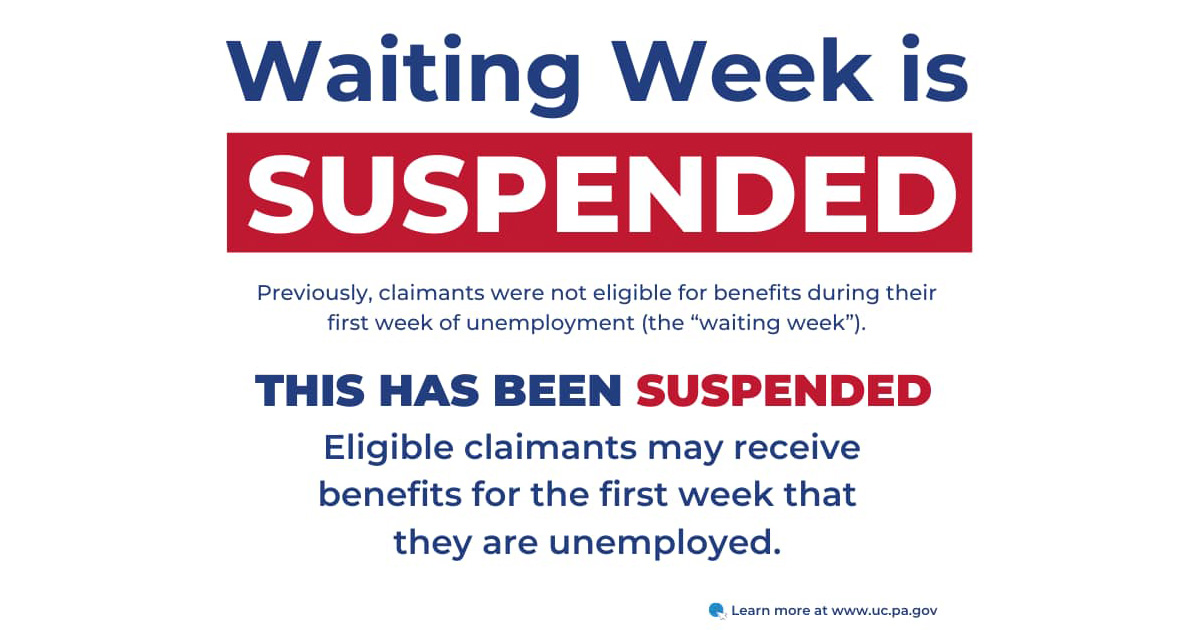
by Christin Brown | March 17, 2020 | News Releases
Provisions of Pennsylvania’s Unemployment Compensation Law will be relaxed for the duration of the COVID-19 Emergency to help workers displaced by the pandemic
Philadelphia, PA, March 17, 2020 – State Senator Christine Tartaglione (D-Philadelphia) welcomes Governor Tom Wolf’s directive to relax the waiting period, work registration, and work search requirements for Pennsylvanians who claim unemployment compensation benefits during the COVID-19 (coronavirus disease) pandemic.
Wolf has instructed the Department of Labor & Industry to suspend the waiting-week requirement in Section 401(e) of Pennsylvania’s Unemployment Compensation Law. As a result, the first week of a worker’s unemployment will be compensable. This suspension will remain in effect for the duration of the governor’s disaster emergency declaration for COVID-19.
The governor has also directed the department to suspend the work registration and search requirements. These measures will also remain in effect for the duration of the disaster emergency.
“As businesses throughout the Commonwealth make the difficult but necessary decision to close or reduce their operations temporarily in response to the public health emergency, many workers find themselves suddenly without income and wondering how they will pay their bills,” Senator Tartaglione said. “The measures initiated by the governor will allow these Pennsylvanians to collect unemployment compensation sooner and help them to protect their financial wellbeing as well as their physical health.”
Pennsylvania’s Unemployment Compensation Law allows for employers to be relieved of charges for compensation once there has been a federal disaster declaration under the Stafford Act and the individual claimants would have been eligible for Disaster Unemployment Assistance. Therefore, an employer may be relieved from charges for compensation paid to an individual with respect to any week of unemployment occurring due to COVID-19.
The Unemployment Compensation website offers up-to-date information for workers impacted by COVID-19. Workers may be eligible for compensation should the employer close temporarily or permanently or should the employee experience a reduction in hours. Displaced workers may apply for compensation online.
# # #
If you would like more information about this topic, please contact William Kenny at 215-533-0440 or William.Kenny@pasenate.com.

by Christin Brown | March 12, 2020 | News Releases
Philadelphia, PA, March 12, 2020 – State Senator Christine Tartaglione (D-Philadelphia) today announced the award of a $116,485 Non-Profit Security Grant to Drizin-Weiss Post 215 in support of safety improvements at the Burholme veterans’ hall and its adjoining shopping center.
“The members of Post 215 served our community and our nation with pride and distinction, so I am thrilled to support their efforts to improve their meeting facility,” Senator Tartaglione said.
“We are enhancing security for the vets that visit the facility as well as the community that uses the center,” Post 215 Commander M.B. Kanis said.
The Post welcomes between 1,800 and 3,000 visitors each month. Its $116,485 grant is being administered by the Pennsylvania Department of Community and Economic Development. Grants totaling $5 million were awarded to 113 organizations in 26 Pennsylvania counties as part of the Non-Profit Security Grant Fund. Amounts ranged from $7,200 to $150,000.
# # #
If you would like more information about this topic, please contact William Kenny at 215-533-0440 or William.Kenny@pasenate.com.

by Christin Brown | March 6, 2020 | News Releases
The senator secured funding through the Department of Community and Economic Development to convert a debris-strewn property into multi-use public space.
Philadelphia, PA, March 6, 2020 – State Senator Christine Tartaglione (D-Philadelphia) delivered a $50,000 development grant to the Mayfair Community Development Corporation during the CDC’s executive board meeting last night. The state funding will support the acquisition and redevelopment of a vacant, debris-strewn lot on the 7300 block of Crispin St.
The CDC plans to repurpose the triangular-shaped lot, which measures more than one-third of an acre, into community park space as well as storage space for local non-profit organizations and businesses that routinely present public events in and around the nearby major intersection of Cottman and Frankford avenues.
“I am pleased and excited to bring this public investment into Mayfair, where residents, businesses and organizations like the CDC are working hard to perpetuate and grow their strong sense of community spirit,” Senator Tartaglione said. “There always seems to be something big and fun happening in Mayfair. I look forward to taking part in their many festivals and celebrations for years to come.”
The funding was awarded through the Department of Community and Economic Development’s Local Share Account program, which disburses a portion of slot machine revenue generated by casino operators in Philadelphia.
“The lot has been an eyesore for the neighborhood, for the (Mayfair) Civic Association and for the CDC for a long time,” CDC Vice Chairman Kevin Leonard said. “To be able to do something positive with that land to help the neighborhood is an excellent thing.”
# # #
If you would like more information about this topic, please contact William Kenny at 215-533-0440 or William.Kenny@pasenate.com.

by Christin Brown | February 27, 2020 | News Releases
Philadelphia, PA, February 27, 2020 – State Senator Christine M. Tartaglione (D-Philadelphia) today announced that the Pennsylvania Commission on Crime and Delinquency has awarded more than $5.3 million in grants to Philadelphia-based schools and community organizations for school safety and community violence reduction initiatives.
The Commission’s School Safety and Security Committee awarded $60 million statewide, including $52.5 million in School Safety and Security Grants and $7.5 million in Community Violence Prevention/Reduction Grants.
“Every Pennsylvania child deserves access to quality education. And it is our responsibility as a Commonwealth to provide every child with a safe, secure, and healthy learning environment,” Senator Tartaglione said. “This funding will help schools and communities in Philadelphia and across the state to bolster their security while implementing programs that reduce the threat of violence.”
The School District of Philadelphia was awarded $2.6 million to support numerous initiatives including conflict resolution, dispute management, and restorative justice strategies; positive behavior support; classroom management; anti-bullying programs; security-related planning and technology; staff and student training; training and compensation of school resource officers and school police; and implementing trauma-informed approaches to education.
Several independent Philadelphia schools received additional funding, including Belmont Charter, Mastery Charter – Pastorius Campus, Overbrook School for the Blind, Philadelphia Academy Charter, and Tech Freire Charter.
Community Violence Prevention/Reduction Grants were awarded to Women Against Abuse, Big Brothers Big Sisters Independence Region, Children’s Hospital of Philadelphia, MEE Productions Inc., Children’s Crisis Treatment Center, Temple University, and City of Philadelphia Department of Behavioral Health and Intellectual Disability Services.
# # #
If you would like more information about this topic, please contact William Kenny at 215-533-0440 or William.Kenny@pasenate.com.

by Christin Brown | February 4, 2020 | News Releases

During his annual budget address today, Governor Wolf said PA should invest in fixing toxic schools, raise its minimum wage, and require the reporting of lost or stolen guns. He is also calling for a lower corporate tax rate while closing the ‘Delaware Loophole.’
Philadelphia, PA, February 4, 2020 – State Senator Christine M. Tartaglione (D-Philadelphia) issued the following statement regarding the fiscal year 2020-2021 budget address delivered by Governor Tom Wolf today to a joint session of the Pennsylvania General Assembly.
Among the governor’s many policies to advance the Commonwealth on a “path to prosperity,” he proposed investing more than $1 billion toward identifying and removing contaminants such as asbestos and lead from schools; raising the minimum wage to $15; reducing the corporate tax rate while closing the “Delaware Loophole”; and requiring gun owners to report to authorities any lost or stolen firearms:
“I applaud Governor Wolf for embracing and taking action on many of the initiatives I have championed in the Senate for many years and those that I continue to advocate. Toxic schools are a statewide crisis that need immediate response from all stakeholders. We need local, state, and federal investment as well as a coordinated effort to protect the health of students, teachers, staff, and all people who visit our schools. I strongly support funding for toxic schools in pending capital budget legislation.”
“Minimum wage is another issue that affects all Pennsylvanians. Raising our minimum wage to a true living wage, as I have proposed in Senate Bill 12, would help us to reduce poverty throughout the Commonwealth and would help low-wage workers afford necessities like food, shelter, transportation, healthcare, and childcare. It would also help businesses by putting more spending money in consumers’ pockets and increase Pennsylvania’s tax revenues.”
“I also agree with the governor that closing the Delaware Loophole and lowering our Corporate Net Income Tax will benefit all Pennsylvanians. My legislation, Senate Bill 1032, would achieve this. Thousands of companies that do business in Pennsylvania and make money here aren’t paying their fair share of taxes. That’s unfair to all taxpayers. By requiring companies to reveal what they really make and pay what they really owe, we will be able to reduce our corporate tax rate, which is among the highest in the nation, and make the Commonwealth more attractive for businesses.”
“Public safety and gun violence is another fundamental issue that we must address. I’m glad that Governor Wolf is calling for common-sense gun laws, like those I have proposed in Senate Bill 483. We must reduce the number of illegal guns on our streets, and we can do that by stopping the people who deal in illegal guns, including straw purchasers. Mandatory reporting will help to protect all Pennsylvanians from gun violence, including law-abiding, responsible gun owners.”
# # #
If you would like more information about this topic, please contact William Kenny at 215-533-0440 or William.Kenny@pasenate.com.
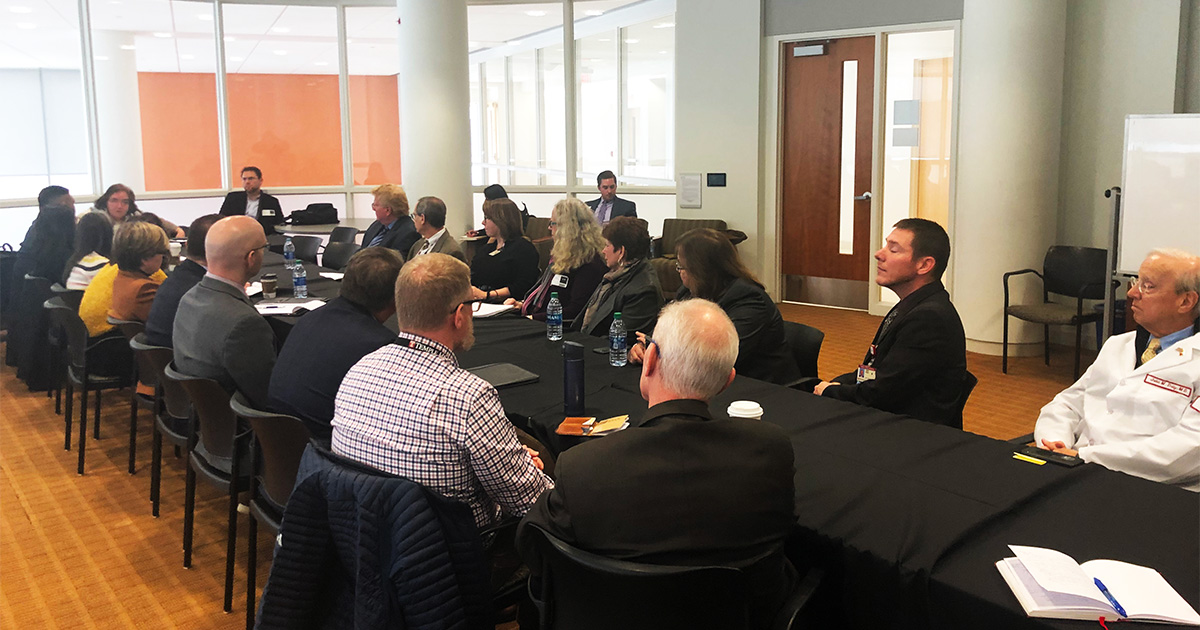
by Christin Brown | January 31, 2020 | News Releases
Philadelphia, PA – January 31, 2020 – In coordination with Governor Tom Wolf’s Reach Out PA: Your Mental Health Matters initiative announced earlier this month, Pennsylvania Department of Health Secretary Dr. Rachel Levine joined Sen. Tina Tartaglione to lead a roundtable discussion on the mental health challenges and needed supports for those with substance use disorder.
The Reach Out PA initiative is a multi-agency effort and anti-stigma campaign aimed at expanding resources and the state’s comprehensive support of mental health and related health care priorities in Pennsylvania. Reach Out PA will address many recommendations for improving mental-health services laid out by the Council on Reform, created last year by the governor’s executive order to protect vulnerable populations.
“As part of the Governor’s Reach Out PA: Your Mental Health Matters campaign, we want everyone to feel comfortable speaking about their mental health,” Secretary of Health Dr. Rachel Levine said. “Talking about mental health issues and the resources individuals need is essential to making sure every resident has access to the care they need. Understanding that it is okay to not feel okay is essential as we work to establish a healthy Pennsylvania for all.”
“At the same time, as advocates and leaders, we must acknowledge the weaknesses in the mental-health system and find ways to ensure that every Pennsylvanian has access to the care they need regardless of location, income and the type of care – including that to support substance use disorder – they need.”
According to a 2017 study from the University of Southern California, approximately 1 million adult Pennsylvanians struggled with serious psychological distress at least once in 2015. Of those adults, more than 27 percent had an unmet need for mental health care. That population includes 42 percent who did not receive mental health care because they could not afford it.
At Friday’s roundtable, mental health providers and advocates, along with community members joined Dr. Levine and Sen. Tartaglione to focus discussion on the mental-health needs and barriers to treatment for Pennsylvanians.
“I’d like to thank the Wolf administration, the medical community, the recovery community, and insurers for convening this roundtable to reinforce and expand our efforts to address Pennsylvania’s opioid emergency.” Sen. Tartaglione said. “As we strive to heal people who suffer from opioid use disorder, it is crucial that we identify and treat the mental health conditions that often contribute to and perpetuate their illness. We must develop and employ an integrated approach that treats the entire person, an approach that prepares patients for a healthy and productive life.”
If you or someone you know is experiencing a mental health crisis or is considering suicide, help is available. Reach out to the National Suicide Prevention Lifeline at 1-800-273-TALK (8255) or contact Crisis Text Line by texting PA to 741-741.
Find more information on the Wolf Administration’s fight against the opioid crisis here.
MEDIA CONTACT: Nate Wardle- 717-787-1783 or ra-dhpressoffice@pa.gov
# # #

by Christin Brown | January 17, 2020 | News Releases
Philadelphia, PA – January 17, 2020 – State Senator Christine Tartaglione (D-Philadelphia) issued the following statement regarding the School District of Philadelphia’s response to asbestos contamination at Alexander McClure Elementary School and at Francis Hopkinson Elementary School:
“I am extremely frustrated and deeply concerned that the School District of Philadelphia was forced to close Alexander McClure Elementary School for a second time today after new environmental testing revealed that the district failed to properly contain hazardous airborne asbestos in the building. The district spent more than three weeks on this emergency project before declaring McClure safe to reopen just two days ago.”
“I am equally disappointed that the district has also detected hazardous asbestos inside Francis Hopkinson Elementary School. Yet – in this case – it has chosen to keep the building open for regularly scheduled classes and activities. It is my understanding that the district notified students’ parents in a letter, but it did not promptly share its new knowledge of this threat with the Philadelphia Federation of Teachers.”
“These two cases, within the context of the citywide toxic schools crisis, raise serious questions about the district’s ability or will to systematically identify and promptly remediate materials that threaten the health of students, faculty, and staff. They also demonstrate a troubling lack of consistent and effective communication by the district with its many stakeholders including students and their families, teachers, staff, and the communities served by the schools.”
“In light of these two cases, and the unresolved complaints of environmental hazards at many other public schools, I call upon the district to complete comprehensive and fully transparent environmental inspections immediately at every public school throughout Philadelphia.”
# # #
If you would like more information about this topic, please contact William Kenny at 215-533-0440 or William.Kenny@pasenate.com.
William Kenny
Communications Director for
State Sen. Christine M. Tartaglione
Office: 215-533-0440
William.Kenny@pasenate.com
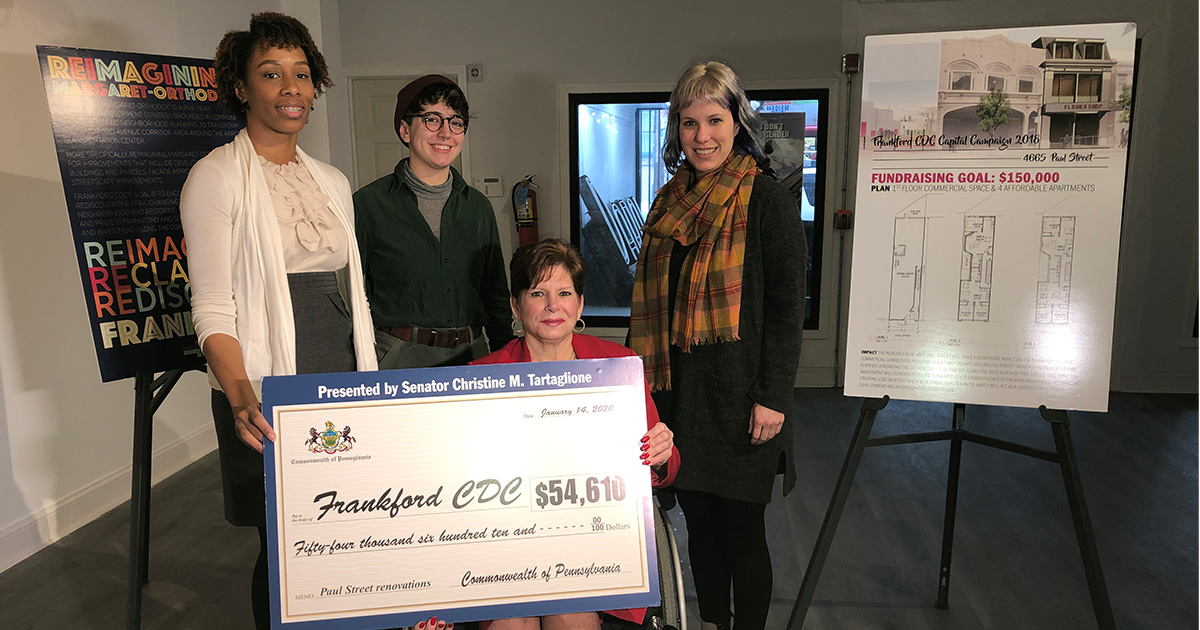
by Christin Brown | January 14, 2020 | News Releases
The Frankford CDC will use the Local Share Account funding to stabilize the blighted Paul Street property and prepare it for commercial and residential redevelopment.
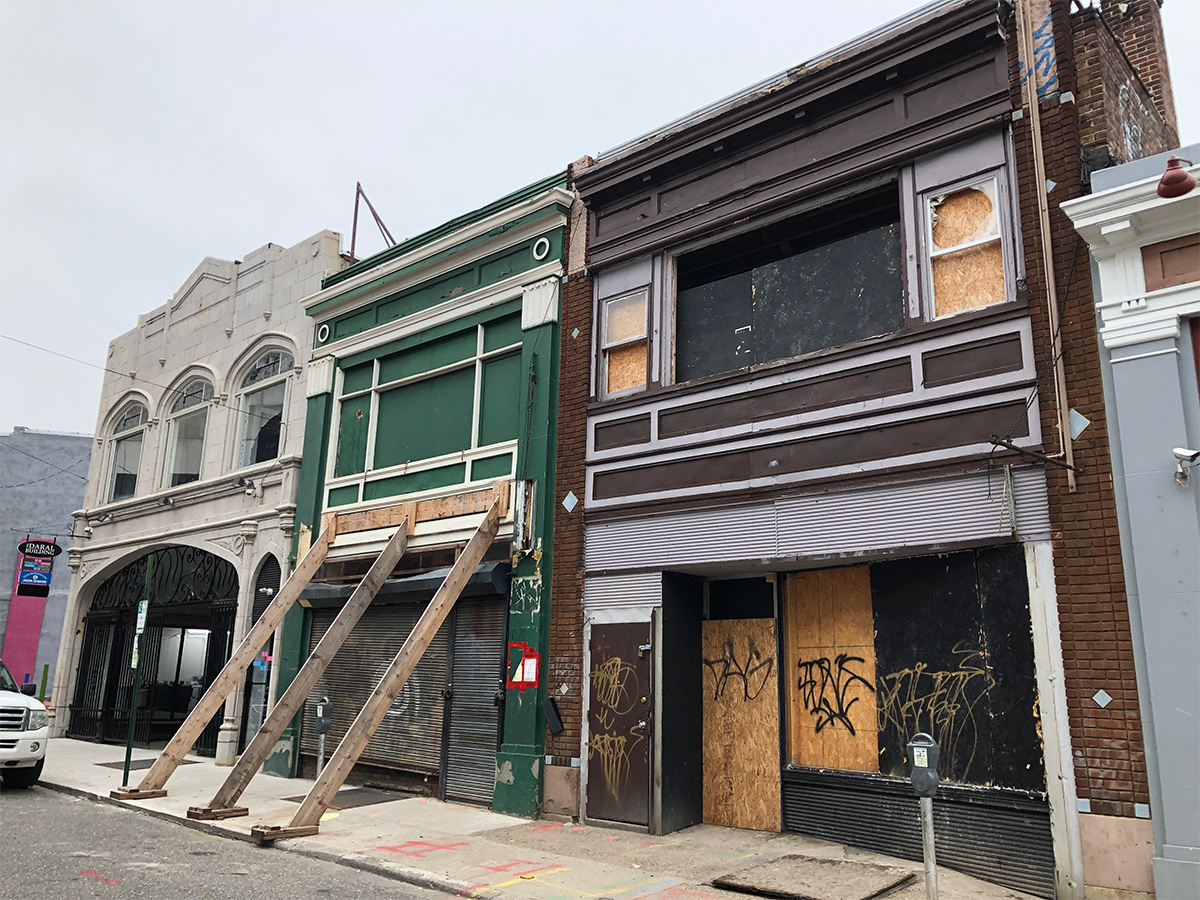 Philadelphia, PA − January 14, 2020 − State Senator Christine Tartaglione (D-Philadelphia) visited the headquarters of the Frankford Community Development Corporation (CDC) today to deliver a $54,610 state grant that will help the CDC to stabilize and rehabilitate a fire-damaged mixed-use property in the heart of the local commercial district.
Philadelphia, PA − January 14, 2020 − State Senator Christine Tartaglione (D-Philadelphia) visited the headquarters of the Frankford Community Development Corporation (CDC) today to deliver a $54,610 state grant that will help the CDC to stabilize and rehabilitate a fire-damaged mixed-use property in the heart of the local commercial district.
“The CDC has made great strides in recent years to revitalize the Frankford Avenue corridor, remove blight, and promote the growth of new businesses. This public investment will enable the CDC to continue its work, which has had a tremendous positive impact throughout the community,” Senator Tartaglione said.
The grant was awarded through the Department of Community and Economic Development’s Local Share Account program, which reallocates a portion of the funds generated by casinos that operate slot machines within Philadelphia.
“The Local Share Account grant will allow the Frankford CDC to stabilize what is now a hazardous and blighted site at 4663 Paul Street,” said Kimberly Washington, Esq., executive director of the Frankford CDC. “This vacant property is the last remaining site on the block in need of improvements, making it vital to the Frankford CDC’s goals to revitalize Frankford Avenue as set out in its Reimagining Margaret-Orthodox initiative.”
On October 26, 2018, flames ravaged the three-story storefront, which is just two doors from the Frankford CDC office and less than a block from SEPTA’s bustling Market-Frankford El. The multi-alarm blaze largely gutted the property, which was being used as an unlicensed boarding house. It burned for several hours and spread to a neighboring building, causing severe damage to the second and third floors of both structures.
 Frankford CDC bought the property last fall and will use the new grant funding for the first phase of its rehabilitation, including cleanout, demolition, framing, roof replacement, and floor stabilization. These measures will address any immediate safety issues and prevent structural damage to neighboring buildings.
Frankford CDC bought the property last fall and will use the new grant funding for the first phase of its rehabilitation, including cleanout, demolition, framing, roof replacement, and floor stabilization. These measures will address any immediate safety issues and prevent structural damage to neighboring buildings.
The non-profit CDC will seek to raise additional funding to complete final renovations that will include commercial space on the ground floor, as well as four affordable housing units on the second and third floors.
# # #
If you would like more information about this topic, please contact William Kenny at 215-533-0440 or William.Kenny@pasenate.com.



























 Philadelphia, PA − January 14, 2020 − State Senator Christine Tartaglione (D-Philadelphia) visited the headquarters of the Frankford Community Development Corporation (CDC) today to deliver a $54,610 state grant that will help the CDC to stabilize and rehabilitate a fire-damaged mixed-use property in the heart of the local commercial district.
Philadelphia, PA − January 14, 2020 − State Senator Christine Tartaglione (D-Philadelphia) visited the headquarters of the Frankford Community Development Corporation (CDC) today to deliver a $54,610 state grant that will help the CDC to stabilize and rehabilitate a fire-damaged mixed-use property in the heart of the local commercial district. Frankford CDC bought the property last fall and will use the new grant funding for the first phase of its rehabilitation, including cleanout, demolition, framing, roof replacement, and floor stabilization. These measures will address any immediate safety issues and prevent structural damage to neighboring buildings.
Frankford CDC bought the property last fall and will use the new grant funding for the first phase of its rehabilitation, including cleanout, demolition, framing, roof replacement, and floor stabilization. These measures will address any immediate safety issues and prevent structural damage to neighboring buildings.